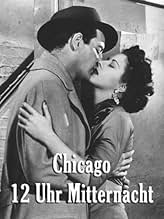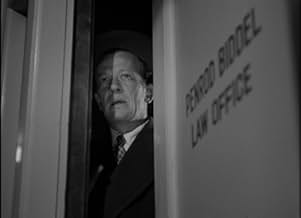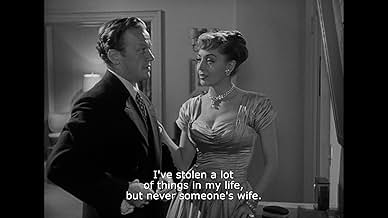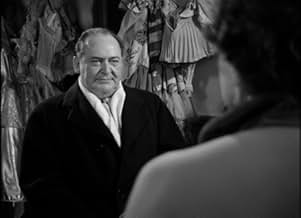VALUTAZIONE IMDb
6,7/10
1751
LA TUA VALUTAZIONE
Aggiungi una trama nella tua linguaJohnny Kelly, who plans on resigning from the police force and leaving his wife the next day, has a very eventful last night on duty.Johnny Kelly, who plans on resigning from the police force and leaving his wife the next day, has a very eventful last night on duty.Johnny Kelly, who plans on resigning from the police force and leaving his wife the next day, has a very eventful last night on duty.
- Regia
- Sceneggiatura
- Star
Tom Poston
- Detective
- (as Thomas Poston)
Roy Barcroft
- Mechanical Man Attraction Hawker
- (voce)
- (non citato nei titoli originali)
Helen Gibson
- Woman
- (non citato nei titoli originali)
Recensioni in evidenza
If you like your mysteries on the strange side, this movie is the one. I keep wondering how they filmed it without any people on the streets. Stock footage to bolster an obviously low budget helps somewhat, but this movie depicts Chicago in the middle of the night, and the only car on the street is the police car occupied by our hero. But this was 1953, so it was a different world at 3:00 a.m. There is a little of "The Asphalt Jungle" in this one--including the crooked lawyer, a pretty woman too evil for comfort, a safe to steal something from and the usual payment at the end. Then there is the twist -- the "ghost" influence -- who is in the middle of the evening's events, and who also narrates. Plus there's a guy portraying a store window mechanical man. Like I said, this is a strange one, but worth a curious look.
This film set in Chicago in 1952 starts ponderously with a voice-over of 'the voice of the city', strangely that of actor Chill Wills (whose voice is more that of a cowpoke or a ranch hand, thus highly unsuitable for this purpose), who then appears in the crime story as a ghostly police sergeant representing the spirit of the city. Really, we could have done without those affectations, and Wills's acting attempts to be mysterious are worse. However, setting all that aside, the rest of the film is a pretty straightforward crime drama which is very good. Gig Young plays a disillusioned policeman vacillating between leaving and staying with his wife and quitting and keeping his job. One wants to kick him so that he stops dithering, but the story requires him to be like that. There are some strong performances: Mala Powers is good as a wild love interest of Young's, Edward Arnold is suave and persuasive as a bent criminal lawyer, Marie Windsor as usual is svelte and corrupt, and William Talman is very effective as a bonkers criminal who wants to shoot everybody, and nearly does. It's all good entertainment, if you look the other way when the pontificating is going on. One needs to take it with a pinch of paprika (the director, John Auer, was Hungarian).
A 1953 Republic gem and a great noir find. This sort of small black and white drama was actually what finished off Republic as TV shows took up this sort of storyline and style, and the studio didn't adapt. Cop Gig Young and burlesque floozie Mala Powers go adulterous and the realism of the noir photography created on actual Chicago streets allow the viewer to be completely absorbed into their cheap backstreet world. This is such an interesting film, and the low budget actually works in its favour......like Monogram's startling DECOY of 1947. Chill Wills appears as a very special and strange character and I won't spoil who he is at all. A very clever and ultimately quite emotional film from a fascinating period in American Cop-dom: 1953...as LA CONFIDENTIAL proved for that city. Find this and relish it, and thank the crummy world of Republic for making it. As a bonus for all us noir-ees, the sensational Marie Windsor is here as well, by the narrowest of welcome margins.
"City That Never Sleeps" is one of the strangest film noir movies I have seen--mostly because there is a real surreal aspect to the story that you just don't find in other noir pictures. I don't want to tell you more about this...suffice to say that one of the characters is VERY unusual and you learn just how unusual at the close of the movie.
Gig Young plays Johnny Kelly, a disaffected cop who is very unhappy in his marriage and is contemplating running off with his mistress, a stripper, and quitting his job on the force. When you see and hear why Johnny is unhappy, you do feel a bit sorry for him, as his evil mother-in-law lives with them and CONSTANTLY harangues him about his wife earning more than him! Instead of belting the old broad in the mouth (definitely a noir way of handling it) he plans on just leaving...for good. But before he does this he has one more night on the job...and a very eventful night it is. While there is MUCH more to the story and a plot involving William Talman who plays an amazingly cold and vicious killer, I think it's best you just see the film for yourself.
The big reveal at the end will determine whether you like this film or not...see the picture and see what I mean. I'd like to say more...but again, just see it for yourself. And, if you want to see it, it's currently up on YouTube.
Gig Young plays Johnny Kelly, a disaffected cop who is very unhappy in his marriage and is contemplating running off with his mistress, a stripper, and quitting his job on the force. When you see and hear why Johnny is unhappy, you do feel a bit sorry for him, as his evil mother-in-law lives with them and CONSTANTLY harangues him about his wife earning more than him! Instead of belting the old broad in the mouth (definitely a noir way of handling it) he plans on just leaving...for good. But before he does this he has one more night on the job...and a very eventful night it is. While there is MUCH more to the story and a plot involving William Talman who plays an amazingly cold and vicious killer, I think it's best you just see the film for yourself.
The big reveal at the end will determine whether you like this film or not...see the picture and see what I mean. I'd like to say more...but again, just see it for yourself. And, if you want to see it, it's currently up on YouTube.
...is but one of the many elements in this quirky film that makes it SO enjoyable. The plot is complex, but still masterfully laid out, the dialogue is clean and effective, and the imaginative direction, lighting, cinematography and editing clearly place "City" in the ranks of minor classics.
In fact, you are rarely aware that this was a low-budget Republic Studios pic. There's one scene near the end...the standard "calling all cars" scene in the police station, which could have been shot with a single guy at a microphone with a bare wall behind him; instead, we see a bee-hive of activity, with several radio cops reflected in a magical labyrinth of glass panes, with shadowy figures passing through the hallway in back of them. It's seemingly insignificant details such as this that keep "City" bristling with intense visuals and character interplay from beginning to end (yeah, the scene with William Talman breaking into Edward Arnold's office at night could have been edited down to about half its length, and the continually recurring stock footage of the police car's POV while racing past a bunch of 1940's parked cars is pretty comical).
Having a heavyweight actor like Arnold in a pivotal role lends acting "gravitas"; William Talman, an actor I've never really cared for, is superb---subtle, cunning, and ultimately maniacal. The confusion between John Kelly Sr. and Jr. as the tension builds is but one of the masterful plot devices, and the subplot of the Mechanical Man (Wally Cassell) and his dreams of an idyllic life with his lady love amidst the wonders of nature is positively brilliant, as is his change of heart and willingness to sacrifice himself for a noble cause. Cassell's physical skill is as impressive as the emotional sensitivity he brings to the role* And how about mother-in-law's offstage nagging of Gig Young? I found it subtly creepy, almost like mother's voice in PSYCHO.
On top of it all, we have the Chill Wills character; you must decide for yourself if it helps or harms the film; I took it as just another off-beat element in this imaginative story of a single night in Chicago. Who knows?--maybe the whole thing was a bad dream from which Gig Young wakes up at the end.
Only Mala Powers disappoints in her role; she was rather miscast as the tough, world-weary dame, though her more sensitive scenes are fine.
* NOTE - The December 22nd, 1960 episode of TV's June Allyson Show was entitled "SILENT PANIC", and featured HARPO MARX as a deaf-mute who works at Christmastime as a Mechanical Man in a department store window; he also happens to be the only eyewitness to a murder on the street. Sound familiar? Unfortunately, the hour-long show fails miserably to live up to its fascinating premise. But I wonder how many other films, radio shows, stories, etc have used this novel plot device over the years.
In fact, you are rarely aware that this was a low-budget Republic Studios pic. There's one scene near the end...the standard "calling all cars" scene in the police station, which could have been shot with a single guy at a microphone with a bare wall behind him; instead, we see a bee-hive of activity, with several radio cops reflected in a magical labyrinth of glass panes, with shadowy figures passing through the hallway in back of them. It's seemingly insignificant details such as this that keep "City" bristling with intense visuals and character interplay from beginning to end (yeah, the scene with William Talman breaking into Edward Arnold's office at night could have been edited down to about half its length, and the continually recurring stock footage of the police car's POV while racing past a bunch of 1940's parked cars is pretty comical).
Having a heavyweight actor like Arnold in a pivotal role lends acting "gravitas"; William Talman, an actor I've never really cared for, is superb---subtle, cunning, and ultimately maniacal. The confusion between John Kelly Sr. and Jr. as the tension builds is but one of the masterful plot devices, and the subplot of the Mechanical Man (Wally Cassell) and his dreams of an idyllic life with his lady love amidst the wonders of nature is positively brilliant, as is his change of heart and willingness to sacrifice himself for a noble cause. Cassell's physical skill is as impressive as the emotional sensitivity he brings to the role* And how about mother-in-law's offstage nagging of Gig Young? I found it subtly creepy, almost like mother's voice in PSYCHO.
On top of it all, we have the Chill Wills character; you must decide for yourself if it helps or harms the film; I took it as just another off-beat element in this imaginative story of a single night in Chicago. Who knows?--maybe the whole thing was a bad dream from which Gig Young wakes up at the end.
Only Mala Powers disappoints in her role; she was rather miscast as the tough, world-weary dame, though her more sensitive scenes are fine.
* NOTE - The December 22nd, 1960 episode of TV's June Allyson Show was entitled "SILENT PANIC", and featured HARPO MARX as a deaf-mute who works at Christmastime as a Mechanical Man in a department store window; he also happens to be the only eyewitness to a murder on the street. Sound familiar? Unfortunately, the hour-long show fails miserably to live up to its fascinating premise. But I wonder how many other films, radio shows, stories, etc have used this novel plot device over the years.
Lo sapevi?
- QuizFirst credited feature film for actor-comedian Tom Poston.
- BlooperStuntman Dale Van Sickel is clearly seen instead of actor William Talman in the shot where Hayes Stewart jumps over the skylight during the rooftop chase.
- Citazioni
Sally 'Angel Face' Connors: When I first came to this town I was gonna be - oh, there were a lot of things I was gonna do. Become famous. But Chicago's the big melting pot, and I got melted, but good.
- Curiosità sui creditiThis motion picture is respectfully dedicated to the police and police departments of America - a brave army of men and women who form our first line of defense in preserving our sacred principles of personal liberty and justice. We gratefully acknowledge the valuable assistance given by the City of Chicago and its police and Police Department, whose cooperation made this picture possible.
- ConnessioniReferenced in Ôsaka no yado (1954)
I più visti
Accedi per valutare e creare un elenco di titoli salvati per ottenere consigli personalizzati
Dettagli
- Tempo di esecuzione
- 1h 30min(90 min)
- Colore
- Proporzioni
- 1.37 : 1
Contribuisci a questa pagina
Suggerisci una modifica o aggiungi i contenuti mancanti




































